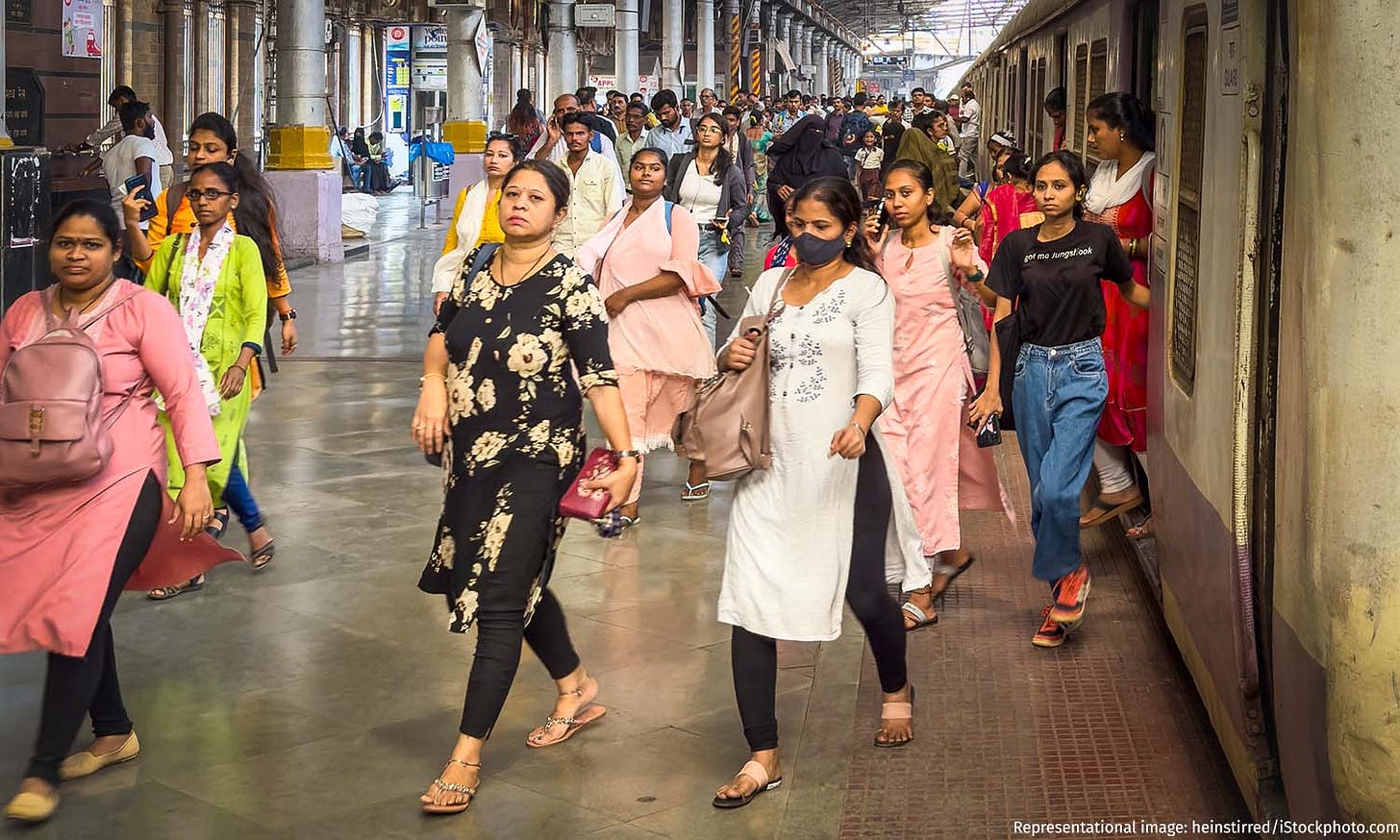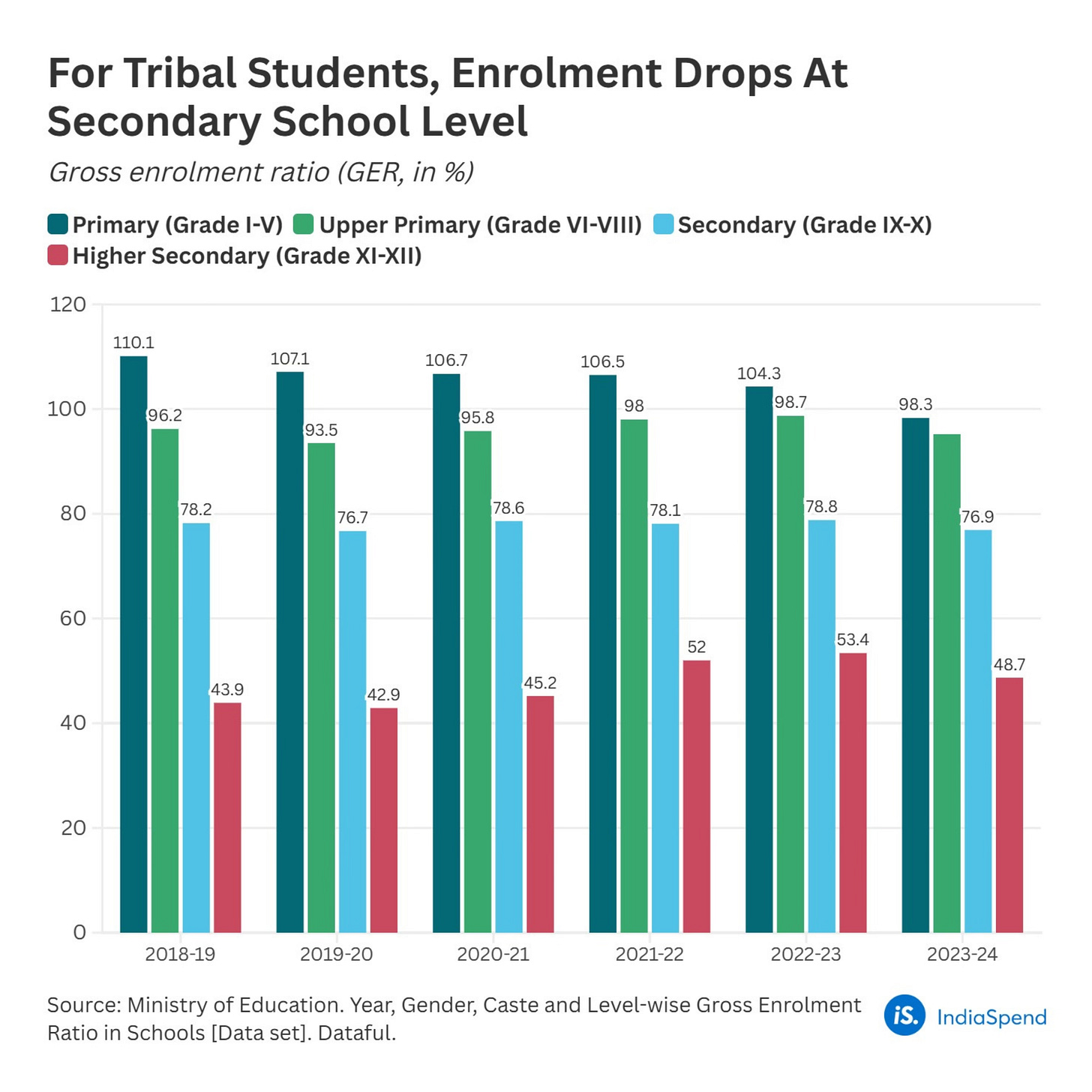The Double Shift
This week, urban women's care work burden, how stigma is derailing TB elimination, how tribal children drop out of school, and more
From urban women burning out under invisible workloads, to tribal children quietly vanishing from school rolls, to TB patients fighting not just disease but deep-rooted stigma, to Indian workers stranded in war-torn Israel -- our stories this week spotlight lives caught at the intersection of policy, pressure, and just plain survival. The data is revealing, but it is the people behind the stats who remind us why these stories matter.
Why Urban Women Are Crumbling Under Care Work
Urban Indian women are working longer hours outside the home than their rural counterparts and yet continue to shoulder an equally heavy domestic burden. India’s 2024 Time Use Survey reveals a stark picture: working urban women spend over 6.5 hours a day on paid work, plus nearly 7 more on unpaid housework and caregiving. That is a recipe for burnout.
Research shows this “double burden” is taking a toll on women’s mental and physical health, with urban salaried women even increasing unpaid labor as they earn more, often at the cost of self-care. Experts argue for urgent reforms: more accessible public childcare, better healthcare, and rethinking how maternity benefits are funded. Flexibility alone, they say, won’t fix broken infrastructure or gender norms. Kawin Kumar reports
Why TB Stigma Still Hurts More Than the Disease
An eight-year-old TB survivor was isolated in her classroom despite being non-infectious. That is the power of stigma. Across India, the fear of social exclusion continues to drive TB patients underground, pushing them to self-medicate with cough syrups instead of seeking diagnosis or treatment. In Rajasthan, a study found that for every one person treated for TB in the private sector, seven were likely missed. With India aiming to eliminate TB by 2025, experts say plugging these gaps is critical, and it starts with involving private pharmacies in case detection.
But poor training, red tape, and the fear of stigma are barriers. Women in particular bear the brunt: they are 13 times more likely to be stigmatized than men. Experts and survivors alike say the battle against TB won’t be won with drugs alone -- as a society, we need empathy, awareness, and enough trained personnel to shift public perception. A story by Charu Bahri
Tribal Kids Are in School—Until They’re Not
India’s tribal children start school in high numbers, but the dropout rates spike alarmingly as they get older. While 98% of tribal kids aged 6–10 are enrolled in primary school, less than half remain in school by ages 16–17, new UDISE+ data show. The reasons: poverty, poor infrastructure, early marriage, language barriers, and bias within the school system. Girls face even steeper odds -- domestic work, safety concerns, and limited facilities push many out by secondary school. In states like Meghalaya, enrolment drops over 70 percentage points between elementary and secondary grades.
Activists say that despite talent and drive, tribal students are let down by an education system that fails to adapt to their realities or nurture their strengths. With elementary-level enrolment also seeing the steepest national dip in 2023-24, the problem is growing younger, and increasingly more urgent. Vijay Jadhav sheds more light on the problem
Caught in the Crossfire: Indian Workers Stranded in a Tense Israel
As tensions ease (for now) between Iran and Israel, hundreds of Indian migrant workers, especially from UP’s Bahraich district, remain stranded and anxious. Many had travelled to Israel in mid-2024 under a government-facilitated employment drive. But the war has disrupted their safety and incomes. Workers like Sandeep Nishad now live with constant sirens, missile alerts, and long hours in bunkers, worried not just for their lives but also for their wages. Families back home are equally alarmed, urging the government to bring them back temporarily.
Meanwhile, Israeli authorities and India’s embassy say they are monitoring the situation and offering support. Critics argue that India’s labour export amid war zones raises ethical concerns, especially as domestic unemployment drives vulnerable youth into risky jobs abroad. For many workers, the dream of a better life is now shadowed by fear, and an urgent longing for home. For IndiaSpend Hindi, Azim Mirza with a ground report






